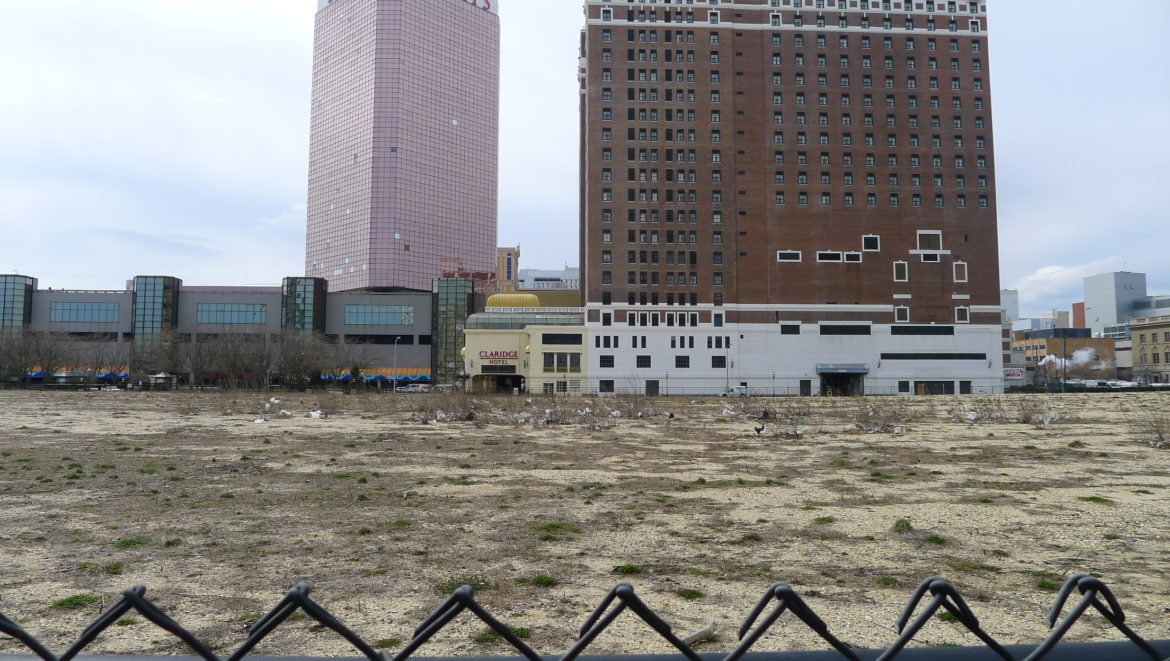This time last year, everyone was abuzz with the next hot thing to save Atlantic City: a massive, vertical, Boardwalk-fronting amusement-park ride known as the PolerCoaster. The $138 million project sounded great on paper – just the kind of non-gaming, family-friendly destination site that the cash-strapped city could use. But did the sound – and looks – of the project distract the people in charge from asking questions about whether its backers had the wherewithal to complete it on time, or even at all?
Atlantic City’s PolerCoaster was supposed to open before Memorial Day 2019, with construction taking 18 months to two years. The site remains untouched. Messages left with the manager, Joshua Wallack, have gone unanswered since January and messages left with the other property owners and developers have also not been returned.
At this point, the city and state have spent time and money ensuring that a redevelopment plan is in place to support the hypothetical project and that it has environmental permits, millions in promised tax credits and sign-off from the planning bosses.
The New Jersey Economic Development Authority last year praised the PolerCoaster proposal for supporting the “transformation” of Atlantic City to a family-oriented destination, according to the NJEDA’s lengthy memo seeking approval for almost $40 million in tax credits for the project. (A spokeswoman for the NJEDA responded to questions about the project’s economic feasibility by referencing the memo).
It’s not that the NJEDA didn’t have questions on the project. They did. The memo shows there were “several months of negotiations” over whether the project would meet the “destination” category. After the developers brought on board Icon Attractions (which operates the Capital Wheel & Carousel at National Harbor) and a project license agreement with Hasbro Inc, the NJEDA upgraded its tax-credit award to 38.4 million from 26 million.
The NJEDA was also skeptical about how many jobs the project would open up (150, tops, with salaries of $28,000 on average) and how much a seasonally-open pay-per-ride entity could really pay in taxes ($52.3 million over 20 years). The funding was dialed down slightly because of the NJEDA’s concerns about the developers’ overly-optimistic employment and taxpaying expectations.
Few questions seem to have been asked about the plans to finance the project, however. The tax credits granted by the NJEDA were not financing, but they are usually sold to banks or other investors, or used as collateral for borrowing. The developers on the project committed to invest 30 percent of their own equity and seek debt financing for the remaining 70 percent. The developers are Mitchell Meckles and Brian Popper (who bought the former Sands casino site from Pinnacle) along with Manhattan condo developers Bernard and Robert Friedman and Joshua Wallack, who runs Mangos Tropical Cafe (Miami’s 10th-highest-grossing restaurant, according to the NJEDA).
Property records show an $11.25 million mortgage on the site from a New York bank called The Berkshire Bank. There are no other financing records. Perhaps a clue, though, lies in the failure last year of the PolerCoaster designer to raise money in a public offering. Does that mean that outside investors don’t support an Atlantic City vertical ride? David Gust, one of owners of the PolerCoaster license, said there was a lot of interest in the PolerCoaster, and in his company – ThrillCorp – building and developing its own PolerCoaster sites, but there was not enough commitment from investors to go through with the company’s offering. He said the failure of that offering was not connected to the Atlantic City project. Gust said he speaks with Wallack “quite frequently… but I would not speak to the status of the financing of their (Atlantic City) project. That’s for them to discuss.”
A project in Orlando (“Skyplex“) backed by Wallack and the Friedmans is also supposed to involve a PolerCoaster, but there have been few official updates since that was first announced.
Cory Morowitz of Morowitz Gaming Advisors worked with the developers to present a market assessment to the EDA. That assessment was paid for by the developers and Morowitz said he did not go into the financial feasibility of the project. “Our analysis was specific to the PolerCoaster and the feasibility of the PolerCoaster,” Morowitz said. “The EDA makes the determination if the developer and the operator have the expertise to operate that kind of business.”
Morowitz said he has not had any contact with the developers since his company’s engagement with them ended, but he believes the project is important for Atlantic City. “These are the kinds of projects that Atlantic City needs to be successful. They need to go beyond the gaming industry, they need projects that are differentiated, that are different from anywhere else,” he said. “There are thousands of malls that people go to. There are casinos everywhere now. Something like this would differentiate the city… it would be a great thing for Atlantic City.”

Pingback: Whither the PolerCoaster? – Wednesday’s Roundup! | Route 40
When are the powers that be going to figure out that Atlantic City will never be a family destination? Ocean City is 5 miles down the road, where would you choose to bring your family?
“But did the sound – and looks – of the project distract the people in charge from asking questions about whether its backers had the wherewithal to complete it on time, or even at all?“. Nah…that never happens in Atlantic City!
How about all those jobs Nextgen is creating?